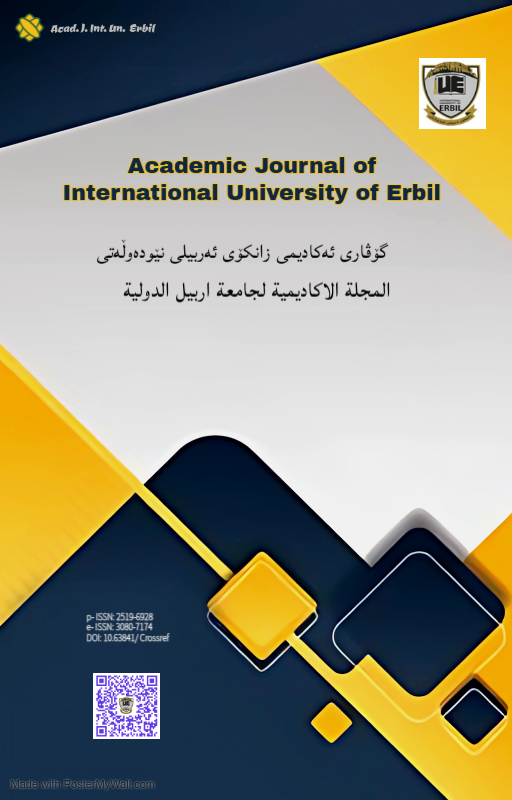Performance of Organizational for Potentially Harnessing the Talents of Knowledge Workers and Competitive Advantages
DOI:
https://doi.org/10.63841/iue12455Keywords:
Knowledge Workers, Talents, Competitive Advantages, Organizational Potential, business environmentAbstract
Abstract
The article depicts how knowledge workers are needed at the core to realize organizational potential and competitive advantage in today's fast-changing business environment. It evidences the requirement to adjust strategy for harnessing the unique talents and skills of knowledge workers, since they are becoming the backbone of innovation and productivity. From the extensive review of literature and based on the analysis of empirical data, organizational culture, leadership style, and knowledge management practices were identified as critical variables influencing knowledge worker productivity. Therefore, motivating the work atmosphere, continuous learning attitude, and strategic talent development policies are critical in developing better knowledge worker involvement and performance. Finally, it provides organizations with at least some ideas regarding how their human capital can serve as a means toward success, growth, and agility in the future through practical recommendations.
References
Agarwal, R. &. (2009). "Dynamic Capability and Firm Performance: The Role of Knowledge Workers.". Journal of Strategic Marketing, 17(5), 389-419.
Al‐Alawi, A. I.‐M. (2007). Organizational culture and knowledge sharing: critical success factors. Journal of knowledge management, 11(2), 22-42.
Azeem, M. A. (2021). Expanding competitive advantage through organizational culture, knowledge sharing and organizational innovation. Technology in Society, 66, 101635.
Bannister, F. &. (2009). Multitasking: The uncertain impact of technology on knowledge workers and managers. Electronic Journal of Information Systems Evaluation, 12(1), pp1-12.
Breu, K. H. (2005). The impact of mobile and wireless technology on knowledge workers: An exploratory study. ECIS 2005 proceedings, 79.
Chen, A. N. (2005). Assessing value in organizational knowledge creation: Considerations for knowledge workers. MIS quarterly, 279-309.
Clarke, P. &. (2000). Knowledge Management and Collaboration. In PAKM.
Davenport, T. H. (2018). the AI Advantage: How to Put the Artificial Intelligence Revolution to Work. MIT Press, 45-61.
Dell'Acqua, F. M.-A. (2023). Navigating the jagged technological frontier: Field experimental evidence of the effects of AI on knowledge worker productivity and quality. Harvard Business School Technology & Operations Mgt. Unit Working Paper, 24-013.
Faraj, K. M., Faeq, D. K., Abdulla, D. F., Ali, B. J., & Sadq, Z. M. (2021). Total quality management and hotel employee creative performance: the mediation role of job embodiment. Journal of Contemporary Issues in Business and Government, 27(1), 3838-3855.
Ferreira, J. J. (2022). Knowledge worker mobility and knowledge management in MNEs: A bibliometric analysis and research agenda. Journal of Business Research, 142, 464-475.
Firdaus, H. B. (2024). Impact of knowledge management on knowledge worker productivity: individual knowledge management engagement as a mediator. Knowledge Management Research & Practice, 1-17.
Mohammed, H. O. (2019). The effect of motivation on employee productivity (A case study private bank in Kurdistan regional government). Restaurant Business journal, 11(118), 119-136.
Mohammed, H. O., Abdullah, N. N., Majeed, H. L., & Sadq, Z. M. The Role of Strategic Leadership in Organizational Learning.
Khan, S., & Abdullah, N. N. (2019). The impact of staff training and development on teachers’ productivity. Economics, Management and Sustainability, 4(1), 37-45.
Grant, R. M. (1996). Prospering in Dynamically-Competitive Environments: Organizational Capability as Knowledge Integration. Organization Science, 7(4), 375-387.
Grant, R. M. (2008). The future of management: Where is Gary Hamel leading us? Long Range Planning, 41(5), 469-482.
Gupta, M. B. (2023). “From Full-Time to Part-Time”: Motivation model for the turbulence-hit knowledge workers. Journal of Business Research, 163, 113926.
Gupta, M. B. (2023). From Full-Time to Part-Time Motivation model for the turbulence-hit knowledge workers. Journal of Business Research, 163, 113926.
Gürdal, S. A. (2014). The relationship between organizational culture and knowledge sharing: Kirklareli sample of manufacturing sector. IIB International Refereed Academic Social Sciences Journal, 5(16), 19.
Heerwagen, J. H. (2004). Collaborative knowledge work environments. Building research & information, 32(6), 510-528.
Heidary Dahooie, J. G. (2018). A valid and applicable measurement method for knowledge worker productivity. International Journal of Productivity and Performance Management, 67(9), 1764-1791.
Hunter, J. &. (2009). Knowledge worker productivity and the practice of self-management. The drucker difference: What the world’s greatest management thinker means to today’s business leaders. 175-194.
Iazzolino, G. &. (2018). Knowledge worker productivity: is it really impossible to measure it? Measuring Business Excellence, 22(4), 346-361.
Kelloway, E. K. (2000). Knowledge work as organizational behavior. International journal of management reviews, 2(3), 287-304.
Khorsheed, R. K., Abdulla, D. F., Othman, B. A., Mohammed, H. O., & Sadq, Z. M. (2020). The Role of Services Marketing Mix 7P's on Achieving Competitive Advantages (The Case of Paitaxt Technical Institute in Kurdistan Region of Iraq). TEST Engineering and Management, 83, 15947-15971.
Kianto, A. S. (2019). The impact of knowledge management on knowledge worker productivity. Baltic journal of management, 14(2), 178-197.
Leong, J. &. (2012). Fostering innovation through cultural change. Library management, 33(8/9), 490-497.
Lin, H. E. (2011). Investigating the role of leadership and organizational culture in fostering innovation ambidexterity. IEEE Transactions on engineering management, 58(3), 497-509.
Mor, S. &. (2018). Fostering the culture of learning and experimentations: An introduction. Culture of learning and experimentation for well-being. 1-18.
Mundbrod, N. K. (2013). Towards a system support of collaborative knowledge work. Tallinn, Estonia, September 3, 2012. Revised Papers, 10 (pp. 31-42). Spring.
Nientied, P. &. (2019). Motivation of knowledge workers–the case of Albania. Organizacija. 52(1), 33-44.
Nonaka, I. (2009). The Knowledge-Creating Company: How Japanese Companies Create the Dynamics of Innovation. Routledge, 175-187.
Óskarsdóttir, H. G. (2022). Towards a holistic framework of knowledge worker productivity. Administrative Sciences, 12(2), 50.
Poul, S. K. (2016). The impact of organizational culture on knowledge sharing. International Review, (3-4), 9-24.
Prahalad, C. K. (1994). Strategy as a field of study: Why search for a new paradigm? Strategic management journal, 15(S2), 5-16.
Pyöriä, P. (2007). Informal organizational culture: The foundation of knowledge workers' performance. Journal of Knowledge Management, 11(3), 16-30.
Sadegh Sharifirad, M. &. (2012). Organizational culture and innovation culture: exploring the relationships between constructs. Leadership. Organization Development Journal, 33(5), 494-517.
Sahibzada, U. F. (2022). Interpreting the impact of knowledge management processes on organizational performance in Chinese higher education: mediating role of knowledge worker productivity. Studies in Higher Education, 47(4), 713-730.
Sarfarazi, B. E. (2022). Identifying the effective factors contributing to talent management in knowledge-based companies with a focus on knowledge worker retention. Journal of Productivity Management, 16(60), 7.
Sari, B. S. (2008). Collaborative knowledge workers: web tools and workplace paradigms enabling enterprise collaboration 2.0. ECOSPACE IP-professional Collaborative Workspace, Dienstag, 1-8.
Scarbrough, H. (1999). Knowledge as work: Conflicts in the management of knowledge workers. Technology analysis & strategic management, 11(1), 5-16.
Senge, P. M. (1990). The fifth discipline: The art and practice of the learning organization. Currency Doubleday. Doubleday.
Teece, D. J. (2007). Explicating Dynamic Capabilities: The Nature and Micro foundations of (Sustainable) Enterprise Performance. Strategic Management Journal, 28(13), 1319-1350.
Vaiman, V. (2010). Managing talent of non-traditional knowledge workers: Opportunities, challenges, and trends. Talent Management of Knowledge Workers: Embracing the Non-Traditional Workforce, 1-22.
Walumbwa, F. O. (2011). Authentic leadership and the knowledge economy: Sustaining motivation and trust among knowledge workers. Organizational dynamics, 40(2), 110-118.
Whelan, E. &. (2011). Integrating talent and knowledge management: where are the benefits? Journal of knowledge management, 15(4), 675-687.
Yamane, Y. (1967). Mathematical formulae for sample size determination. J. Mathematics’, 1, 1-29.
Zhang, Z. (2018). Organizational culture and knowledge sharing: design of incentives and business processes. Business Process Management Journal, 24(2), 384-399.
Downloads
Published
Issue
Section
License
Copyright (c) 2024 Academic Journal of International University of Erbil

This work is licensed under a Creative Commons Attribution 4.0 International License.












